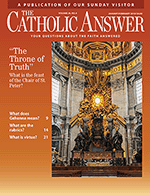 If you are not subscribing to The Catholic Answer, you’re missing a lot of good stuff. My column for the Jan/Feb issue jumps off an interesting piece on the Feast of the Throne of Peter, to ponder why it is that the Vicar of Christ–beginning with Peter, himself–does not swagger:
If you are not subscribing to The Catholic Answer, you’re missing a lot of good stuff. My column for the Jan/Feb issue jumps off an interesting piece on the Feast of the Throne of Peter, to ponder why it is that the Vicar of Christ–beginning with Peter, himself–does not swagger:
For competitive purposes, our fathers were invested with outsized swagger, but, in truth, we held them in a bit of awe and wonder. If our mothers were so familiar to us that we went running to them interchangeably for Band-Aids and drinks of water, our fathers were mysterious: they were partial-absentees who nevertheless held enormous power over the life of the family, both in their provisions and their persons. We loved them and needed them, but differently from our mothers, and a little distantly, because we were less sure that they needed us.
Perhaps because they were a generation raised in economic privation and then tested by war, these men projected a quiet sort of strength and invulnerability. Children were not privy to the thoughts of grown men, but if we had to guess, we would have imagined our fathers as functioning like renaissance American hybrids — half Thomas Edison, half Walt Whitman — who were all thinking lofty, inventive thoughts about The Future and Mankind and Progress.
One day, though, I saw one of these fathers — the he-manliest of the he-men by my estimation — say and do something surprisingly out of character. He suppressed his own often-articulated position and instead agreed with a group around him whose thoughts, I knew, were not his thoughts. The inconsistency bothered me, but there was nowhere I could go with my questions. It took a few more years of growing before I began to realize that men and women sometimes say things they do not mean, in order to deliver themselves up to others as acceptable; that the impetus for all of our lies resides within our need to be accepted and not pushed aside. The need to be accepted, even loved, is only human, but it can be dangerous, because it makes us weak, and when we are weak, we are prey to opportunistic aggressors, bullies, evil and sin.
Read the rest, here to find out what that meant for Peter, and has meant for all of his successors, too.











